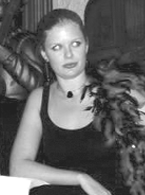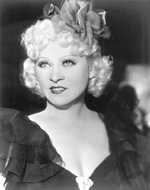Mae’s birthday party; Macken-drick’s magic; picks and a pan
That we now live in the most debased of times was proven without a doubt by the recent Comedy Central TV Friars’ Roast of Pamela Anderson. Although The New York—don’t you know, we’re really hip, too!—Times saw fit to give it front page arts coverage, this one really scraped bottom as a craven display of vulgarity with Anderson’s ex, Tommy Lee, complacently listening to and adding his own crass references about her vagina and her fellatio expertise. A desperate Andy Dick actually gropes her famous breasts for a TV eternity. What hath Mae West, that pioneering female sex crusader, wrought?
These thoughts kept occurring to me as I joined the celebration of what would have been West’s 112th birthday on August 17 at Bill’s Gay Nineties restaurant, the perfect Belle Époque townhouse setting on East 54th, with its gaslight fixtures and vintage posters––Nazimova, Billie Burke, Olga Nethersole, Mary Garden in “Louise.”
All of us owe West, an original if ever there were one, a huge debt of gratitude, for not only breaking down puritanical barriers as a fully empowered, healthily lusty lady, but for all the sheer joy her comic writing and performances have given generations of fans. Her 1926 Broadway play “Sex” landed her in jail as a “lewd corrupter of youth,” while her follow-up work, “The Drag,” was an early attempt to deal with the subculture of homosexuality and cross-dressing, culminating in a big onstage drag ball.
West made her film debut in 1932 when she was nearly 40 with a slightly simian face and fulsome figure that were anything but conventionally beautiful, and yet managed to effectively wipe all her contemporaries off the screen. And she did it with a gift that is fast-disappearing from our contemporary culture––true wit, which relied more on a sly suggestiveness and faultless timing than any gross display of t & a or toilet humor.
West’s two best films are “She Done Him Wrong” and, especially, “I’m No Angel,” in which she plays Tyra––yes, the supermodel Banks was named after this character––who tames lions and every man in Manhattan. These pre-Hays Code nifties celebrated Mae in all her unabashed, ogling glory and, if there’s a more delightful film scene than the one in “I’m No Angel,” wherein she shimmies with her cadre of maids to “I Found a New Way to Go to Town,” I don’t know what that is.
Even her films made after censorship bit down hard on her are worth watching, like her engaging “Goin’ to Town” (1935). It includes her jaw-dropping rendition of the aria from “Samson et Delilah,” “Mon coeur s’oeuvre a ta voix,” unrivalled for brazen diva chutzpah until Aretha Franklin’s version of “Nessun dorma” at the 1998 Grammy Awards.
Show biz vet Joe Franklin recalled the time the diminutive West appeared on his show, with her muscleman companion towering above her: “She said, ‘Joe, This man’s 6 feet 8, I’m 5 feet tall, and he’s nuts over me,’ and this was on live TV!”
The evening also included an excerpt from LindaAnn Loschiavo’s play, “Courting Mae West,” and, in the title role, charming 24-year-old Marta Reiman had the old girl down, from the snowy, shifting shoulders to those rollercoaster eyeballs.
The Tulsa, Oklahoma native, a newcomer to New York, said, “I knew what Mae West looked like, but hadn’t watched any of her movies. Now I’ve seen all of them and, honestly, this is the most fun role I’ve ever played. She was a fabulous comedienne, and I love that she not only was a star, but broke so many barriers with ‘Sex,’ and was always pushing the envelope with cen
sorship. I admire that and the fact that she was a writer and producer, as well, and had complete control over her work, which I hope to do.”
Starting on September 5, the Museum of Modern Art presents “Alexander Mackendrick: Auteur and Academic” (through September 30; call 212-708-9400). Although the American-born, Scottish-bred Mackendrick (1912–93) only made nine films, three of them, “Whiskey Galore,” “The Man in the White Suit” (Alec Guinness’ finest farce) and “The Ladykillers” are high points of the classic, highly individual British comedy genre created at Ealing Studios. Additionally, Mackendrick’s acrid “Sweet Smell of Success,” although a 1957 critical and commercial disaster, is now universally accepted as one of the most influential, not to mention quotable, films ever made.
Coincidental with this retrospective is the publication of “Alexander Mackendrick: On Film-Making” (Farrar, Straus & Giroux), a collection of the director’s essays on his craft. His career rather dried up after the failure of “Success’” and he became dean of the School of Film/Video at the California Institute of the Arts, a position he held from 1969 until shortly before his death.

MOMA is showing the rare “Mandy” (1952), a sensitively wrought film about a young couple (Phyllis Calvert, Terence Morgan) dealing with their young, deaf mute daughter. They enroll her in a special school and Mackendrick has scenes that powerfully prefigure “The Miracle Worker” in their delineation of the child’s slowly burgeoning communicative skills.
“Whiskey Galore” was a quirky, memorable directorial debut for Mackendrick, fully evoking his Scot roots, and, like “The Man in the White Suit,” features the singularly enchanting actress Joan Greenwood (1921-87). In a 1995 poll, she was chosen by Britain’s Empire Magazine as one of the 100 sexiest stars of all time, a title won largely through her voice, perhaps the most distinctive of any film actress. She sounded as though she had gargled with champagne, in one famous description, fathomlessly husky and irresistibly plummy at the same time.
An alumnus of the Royal Academy of Dramatic Art, Greenwood made her theatrical debut at age 17 in “The Robust Invalid,” and followed that with the role of Little Mary in the West End production of “The Women.” She made her Broadway debut in T.S. Eliot’s “The Confidential Clerk” (1954), and worked continuously on stage, screen, and TV. Her favorite film was Ealing’s “Kind Hearts and Coronets,” but she also went to Hollywood.
“I couldn’t put up with all the palaver of keeping out of the sun, dyeing one’s hair, and worrying about the size of one’s bosom,” she is said to have remarked. “ [At Ealing,] we used to wash our hair in buckets and we survived on toasted sandwiches, chocolate, and soup.”
Greenwood was an unforgettable Gwendolyn in “The Importance of Being Earnest” (1952), intoning, “I rejoice to say that I have never seen a spade,” and, for all of the claims of Audrey Hepburn’s unique charisma, if you review her Ascot scene in “My Fair Lady” or the strip club sequence in “Breakfast at Tiffany’s,” you will hear the distinct echo of Greenwood’s timbre and timing.
I’m afraid I must part company with Gay City News’ review of Terrence McNally’s latest play, “Dedication or The Stuff of Dreams.” I found it a glib, melodramatic, and false farrago. Marian Seldes is an undisputed New York theater treasure but even her Garbo-esque shoulders must getting weary; McNally here has her putting up with being called “a cunt,” exposing a cancer-ravaged bald skull (which only heightens Seldes’ uncanny resemblance to John Gielgud), and facing a final indignity from Nathan Lane, somewhat muted on this occasion, but doing his usual.
The real giveaway is the dialogue—not that of the sophisticatedly hip characters, like Seldes and Lane, who get the choicest bon mots, but those words delivered by the more salt-of-the-earth, blue-collar types, which are obscenity-laced, but with the deadly flatness and falseness of the worst TV sitcoms or soap operas.
On the brighter side of things, I can heartily recommend two recently opened films, which entertainingly represent the contrasting poles of this summer’s screen fare. “The Constant Gardener” is a wonderfully relevant, edgily handled political thriller with a hauntingly strong performance by Rachel Weisz. “The 40-Year Old Virgin,” while at times rivaling the Pamela Anderson roast for crudeness, manages to be both outlandishly funny and rather touching. You will laugh out loud, and it has the most unpredictably fun ending of any film this year.
Contact David Noh at Inthenoh@aol.com.
gaycitynews.com






































